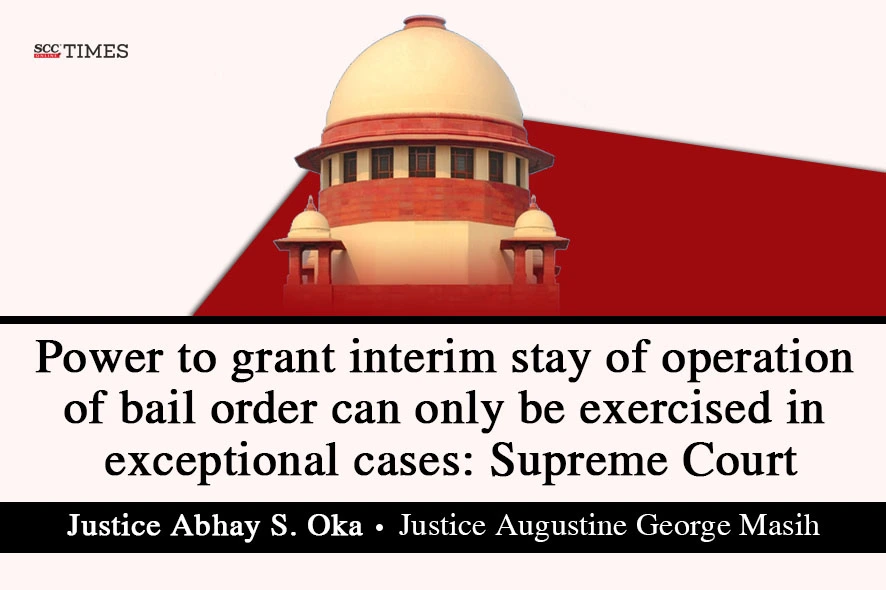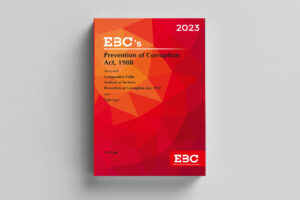Supreme Court: In a criminal appeal concerning the power of the High Court or Sessions Court to grant an interim order of stay of operation of an order granting bail till the disposal of the application for cancellation of bail under Section 439(2) of the Code of Criminal Procedure, 19731 (‘CrPC’), the division bench of Abhay S. Oka* and Augustine George Masih, JJ. while setting aside the impugned orders has held the following:
-
In an application made under Section 439(2) of the CrPC or other proceedings filed seeking cancellation of bail, the power to grant an interim stay of operation of order to bail can be exercised only in exceptional cases when a very strong prima facie case of the existence of the grounds for cancellation of bail is made out. While granting a stay of an order of grant of bail, the Court must record brief reasons for concluding that the case was an exceptional one and a strong prima facie case is made out.
-
As a normal rule, the exparte stay of the bail order should not be granted. The said power can be exercised only in rare and very exceptional cases where the situation demands the passing of such drastic order. Where such a drastic exparte order of stay is passed, it is the duty of the Court to immediately hear the accused. on the prayer for continuation of the interim relief. When the Court exercises the power of granting exparte ad interim stay of an order granting bail, the Court is duty bound to record reasons why it came to the conclusion that it was a very rare and exceptional case where a drastic order of exparte interim stay was warranted.
Background:
In 2020, the Central Bureau of Investigation (‘CBI’) registered a crime against two companies and two individuals for the offences punishable under Section 120-B2 read with Sections 4203, 4674, 4685 and 471 of the Penal Code and Section 13(2) read with Section 13(1)(d) of the Prevention of Corruption Act, 1988. The subject matter of offence, inter alia, was the loan account of Jay Polychem India Ltd. In 2021, the Enforcement Directorate (‘ED’) registered an Enforcement Case Information Report (‘ECIR’) for an offence punishable under Section 4 of the Prevention of Money Laundering Act (‘PMLA’). Eleven persons were shown as accused in ECIR. However, the appellant was not shown as an accused. Thereafter, the ED filed a complaint before the Special Court under Section 44(1)(b) of PMLA. Even in the complaint, the appellant was not shown as an accused. From 2020 to 2023, ED had called the appellant for investigation several times. Though the appellant cooperated, on 20-01-2023, the appellant was arrested.
The first bail application made by the appellant was rejected by the Special Court. Thereafter, appellant filed two separate applications seeking bail. Though the Special Court declined to grant bail under Section 167(2)6 of the CrPC, granted regular bail after recording a finding that the appellant satisfied the twin conditions for grant of bail incorporated in Section 45(1)(ii) of the PMLA. Aggrieved, the ED filed an appeal before the Delhi High Court, wherein the Court directed that the case should be listed on 26-06-2023 and in the meanwhile, the order granting bail will remain stayed. The hearing could not be held on 26-07-2023. After two days, the case was listed before another Single Judge who continued the interim relief of stay. Thereafter, the application was adjourned from time to time. Once the application for cancellation of bail was fully argued before a judge, the order was reserved. However, the Judge recused himself. Thereafter, there were two more recusals.
This Court, by the order dated 7-06-2024, stayed the order of stay and clarified that the appellant would be entitled to benefit of the order passed by the Special Court granting bail. Accordingly, the appellant has been enlarged on bail.
Issue: What is the power to grant interim stay of order granting bail?
Analysis and Decision:
The Court said that when a person is arrested, the rights guaranteed by Article 21 of the Constitution of India get substantially curtailed. The effect of the grant of bail is that the liberty of the undertrial accused is restored pending the trial, subject to the accused of complying with the conditions of bail. When the High Court or Sessions Court stays such an order, it amounts to taking away the liberty granted under the order of bail.
The Court suggested that when an application for cancellation of bail is filed, the High Court or Sessions Court should be very slow in granting drastic interim relief of stay of the order granting bail. Further, it said that if the accused is released on bail before the application for stay is heard, the application/proceedings filed for cancellation of bail do not become infructuous. The interim relief of the stay of the order granting bail is not necessarily in the aid of final relief.
The Court also emphasised that an exparte stay of the order granting bail, as a standard rule, should not be granted. The power to grant an exparte interim stay of an order granting bail has to be exercised in very rare and exceptional cases where the situation demands the passing of such an order. Moreover, he Court must record specific reasons why it concluded that
it was a very rare and exceptional case where a very drastic order of exparte interim stay was warranted. Moreover, since the issue involved is of the accused’s right to liberty guaranteed by Article 21 of the Constitution, if an exparte stay is granted, by issuing a short notice to the accused, the Court must immediately hear him on the continuation of the stay.
Concerning the present case, the Court said that the High Court ought to have heard the Advocate before granting the stay. But that was not done. Thus, it was an exparte order of stay. The failure to hear the advocate for the accused and the failure to record reasons vitiate the order of stay
The Court remarked that it is so apparent from the first impugned order that the order granting bail was mechanically stayed without considering merits.
Thus, the Court said that the order of stay granted without hearing the accused continued to operate for more than one year without hearing the accused on merits. Further, while remarking that this is a sorry state of affairs, the Court said that the exparte order staying the order of bail passed without considering merits cannot continue to operate for one year without the appellant getting a hearing on the issue of continuation of the interim order. All Courts have to be sensitive about the most important fundamental right conferred under the Constitution, which is the right to liberty under Article 21.
The Court concluded that the case was not the one that could have been termed a rare and exceptional case where an order granting bail ought to be stayed.
Therefore, the Court, while setting aside the impugned orders, said that pending the hearing of application for cancellation of bail, the order passed by the Special Court will continue to operate. The Court also clarified that all the contentions on the merits of the application for cancellation of bail are expressly left open to be decided by the High Court.
CASE DETAILS
|
Citation: Appellants : Respondents : |
Advocates who appeared in this case For Petitioner(s): For Respondent(s): |
CORAM :
Buy Code of Criminal Procedure, 1973 HERE
Buy Constitution of India HERE
Buy Penal Code, 1860 HERE
Buy Prevention of Corruption Act, 1988 HERE
1. Section 483(3) of Bharatiya Nagarik Suraksha Sanhita, 2023
6. 187 of BNSS, 2023












